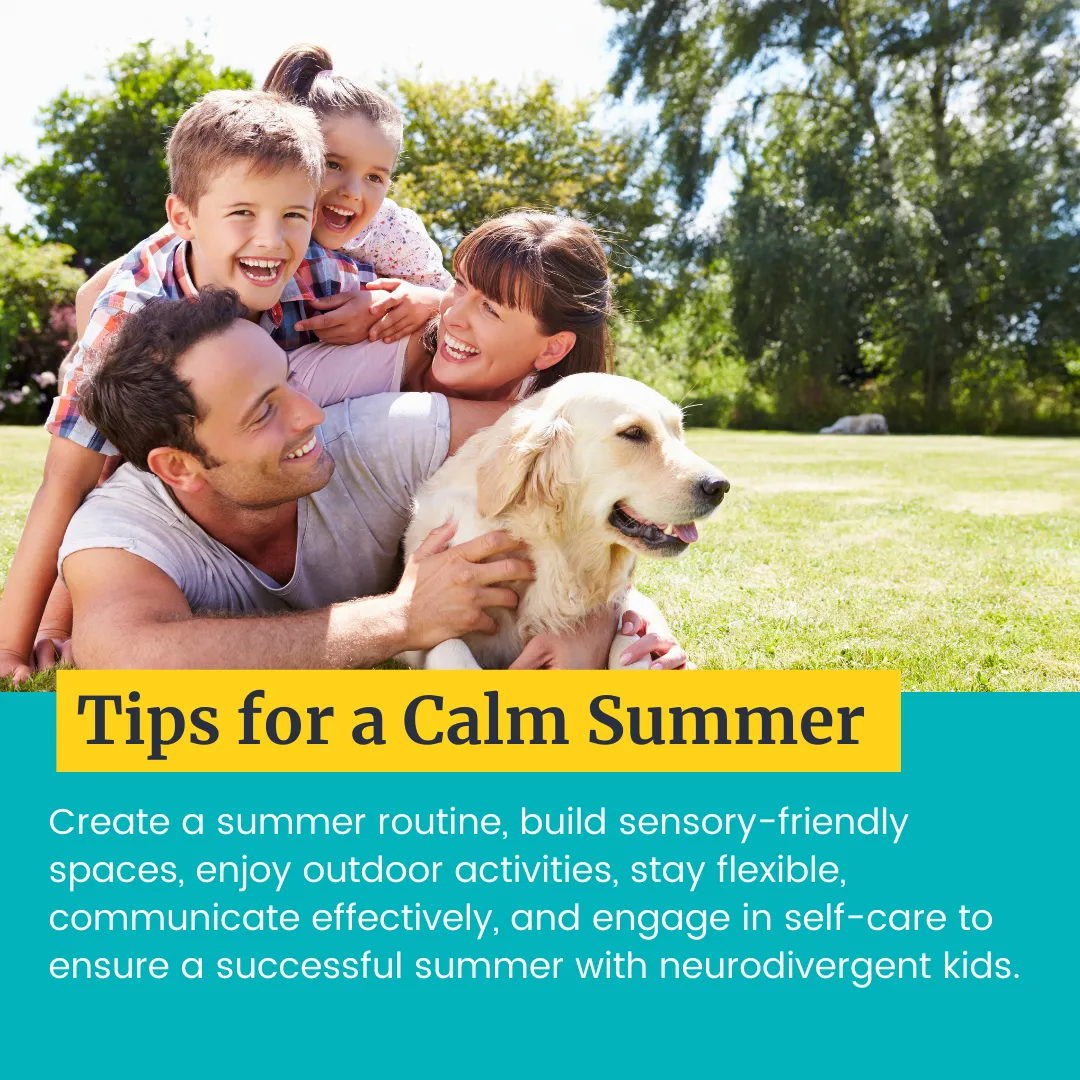
Tips for a Calm Summer
Making Your Summer Shine: Tips for a Successful Summer with Neurodivergent Kids
School is out for the summer! Are you wondering how to make the summer successful and reduce meltdowns? Check out the 5 tips below, with a bonus 6th tip!
1. Create a Summer Routine
Routine is key for many neurodivergent kids who experience high levels of anxiety. A predictable schedule helps them know what to expect and reduces the stress of unexpected changes.
Why Routine Matters:
- Reduces anxiety by providing structure.
- Helps kids transition smoothly between activities.
- Encourages a sense of security and stability.
How to Implement:
- Make a visual schedule: Include pictures or icons for daily activities.
- Break down the day: From wake-up to bedtime, outline each step (e.g., wake up, get dressed, eat breakfast).
- Adjust to your child's needs: Whether they need a detailed plan or a simple outline, customize the schedule to fit their comfort level.
2. Build Sensory-Friendly Spaces
Creating a calming space for your child to retreat to when they're overwhelmed can make a huge difference. This can help your child self-regulate and feel at peace in your home.
What to Include:
- Noise-canceling headphones to block out unwanted sounds.
- A cozy corner with soft blankets and pillows.
- Fidget toys or sensory bins filled with kinetic sand or water beads.
Tips:
- Find a quiet nook in your home where your child can go to be alone.
- Let them help decorate the space to make it their own.
3. Go on Outdoor Adventures
Outdoor activities can be incredibly beneficial for self-regulation and burning off energy.
Ideas for Outdoor Fun:
- Nature walks or hikes in less crowded areas.
- Playing in the backyard or setting up a tent for a backyard camping adventure.
- Visiting local parks during off-peak hours.
Benefits:
- Exposure to fresh air and sunlight.
- Physical activity that helps with sensory regulation.
- Opportunities for unstructured, creative play.
4. Have Flexible Expectations
While it's great to have a plan, flexibility is crucial. Sometimes, things don't go as expected, and that's okay.
Tips for Flexibility:
- Be prepared to pivot if an activity becomes overwhelming.
- Celebrate small victories and adjust plans as needed.
- Remember, the goal is to enjoy time together, not to stick rigidly to a schedule.
5. Communication is Key
Effective communication can make or break your summer plans. Understanding your child's needs and preferences helps create a more harmonious experience.
Strategies:
- Use simple language and visual aids to explain plans.
- Encourage your child to express their feelings and needs.
- Practice discussing emotions and coping strategies during calm moments.
Example:
- Use tools like the Diane Alber Spot books and plush toys to help children identify and communicate their emotions.
BONUS: Engage in Self-Care for Yourself
Taking care of yourself is just as important as taking care of your kids. When you're recharged, you're better equipped to handle the demands of parenting.
Self-Care Ideas:
- Enjoy a quiet cup of herbal tea before the kids wake up.
- Take a solo walk or run outside to get some fresh air and sunshine.
- Listen to your favorite music, sing along, or dance around the house.
Remember:
- Self-care isn't selfish; it's essential. Even five minutes a day can make a difference.
- Find activities that bring you joy and help you relax.
By implementing these tips, you can create a summer filled with fun, relaxation, and meaningful moments with your kids. Share your summer routines and tips with us on Instagram or TikTok, and let's make this a summer to remember!
